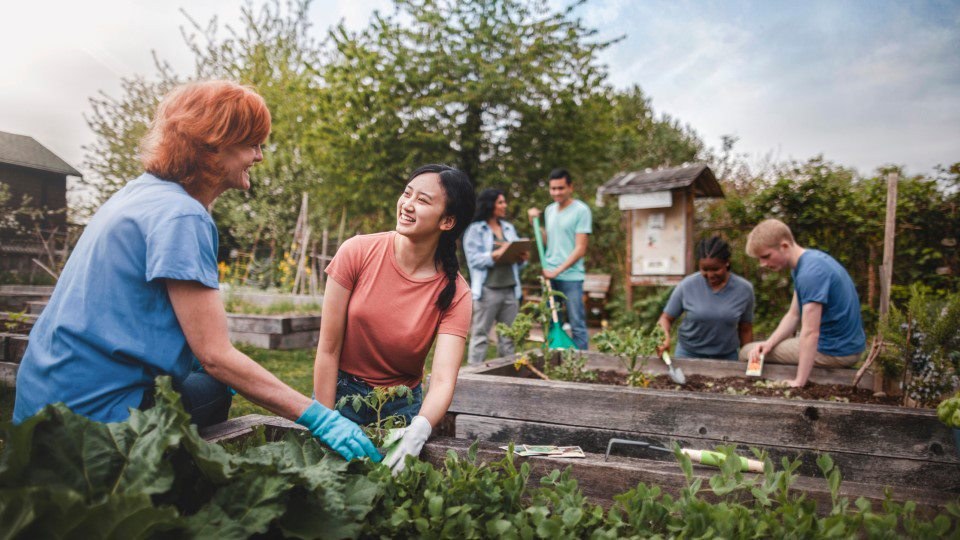Climate change is affecting communities across Canada, but it may not affect everyone in the same way.
Underserved neighbourhoods that lack access to urban nature and green spaces are less resilient to events like flooding and heat islands, which are becoming more prevalent as a result of climate change, according to Christine Mettler, Director, Green Infrastructure at Green Communities Canada.
This lack of access to green spaces disproportionately impacts certain groups, including racialized and Indigenous communities, seniors, youth and children, newcomers to Canada, low-income communities, people with pre-existing health conditions and/or disabilities, and communities that have traditionally been economically dependent on carbon-intensive industries, Mettler said.
"Green infrastructure makes our communities more resilient to climate change. It also makes them more vibrant, sustainable, and healthy places to live," Mettler said.
To help those groups who may be more susceptible to the effects of climate change, Green Communities Canada – a national non-profit based in Peterborough, Ontario – supports grassroots-led climate action through leadership, connection, training, and funding.
The organization focuses on community-led solutions to help build thriving and equitable green infrastructure, which can include everything from naturally occurring ecosystems (e.g., forests, meadows, wetlands) and planted vegetation (e.g., gardens, trees) to engineered features that use vegetation and natural processes (e.g., green roofs, bioswales, permeable pavements).
The 2022 TD Ready Challenge
Green Communities Canada is one of 10 Canadian and American grant recipients of the 2022 TD Ready Challenge, an annual initiative that seeks to support non-profit and charitable organizations focused on developing innovative, impactful, and measurable solutions for a changing world. This is achieved through an annual problem statement which is different every year and asks community-based organizations and non-profits to respond with their ideas on how to address that year's problem statement .
This signature program is a key component to delivering on the Bank’s corporate citizenship platform, the TD Ready Commitment.
The 2022 TD Ready Challenge problem statement concerned designing solutions to help people and communities who may be disproportionately affected by climate change; to prepare for, adapt to and help mitigate the potential impacts of climate change; and/or to work towards a transition to a low-carbon economy.
Green Communities Canada will receive $1 million from the 2022 TD Ready Challenge for its Living Cities Canada program, which is designed to support local organizations in 10 cities across the country as they look to build large-scale green infrastructure projects to better prepare vulnerable communities for increased flooding, extreme heat, and other impacts of climate change.
"With the TD Ready Challenge grant, we’ll be able to develop a process to support the organizations that we work with to really understand where the need is and deploy participatory processes that will help empower residents of those 10 cities to take climate action where they live," Mettler said.
"This grant will help the green infrastructure projects we create to be the most effective and equitable that is possible."
The Living Cities Canada program will be deployed by Green Communities Canada with climate-focused organizations in the following 10 cities: Saskatoon, Winnipeg, Ottawa, Thunder Bay, Peterborough, Waterloo, Hamilton, Montréal, Moncton and Saint John.
Each local organization will receive the direct financial support, structured coaching, and resources needed to help them implement repaving initiatives, reforestation, and other targeted nature-based solutions. The Living Cities Canada program emphasizes a participatory planning process with meaningful community engagement, where residents and businesses are part of creating and stewarding local projects.
'Depaving' in Montreal
One local organization is the Montréal Urban Ecology Centre, a non-profit organization that has worked with Green Communities Canada on "depaving" projects to transform paved surfaces into green spaces.
Through the Living Cities Canada program, the Montréal Urban Ecology Centre will in turn deliver training to other climate-focused organizations about participatory planning, how to identify the social and environmental areas with the highest needs for climate assistance, how to engage and involve local residents (including a diverse slate of voices), as well as asset mapping and project co-design.
"Since citizens are in their neighbourhood every day, they can provide knowledge and observations that are different from experts," said Vincent Ouellet Jobin, Chargé de projets et développement at Montréal Urban Ecology Centre. "Participatory planning draws on that experience to help enrich projects so they can truly meet the communities’ needs."
The Montréal Urban Ecology Centre said participatory planning takes time and resources, but also helps to encourage communities to adopt initiatives, supports active citizenship and ensures the spirit of the project is maintained in the long term.
"The TD Ready Challenge grant received by Green Communities Canada will help give us time and resources to co-design green infrastructure together with the people that will benefit from them. It will allow us to design a project that is truly equitable, sustainable and supported by the community," said Ouellet Jobin.
Over the last decade, Green Communities Canada has supported more than 100 green infrastructure action projects in more than 30 cities, resulting in the removal of 16,000m2 of asphalt, planting over 12,000 flowers and trees, and diverting 25,000m3 from stormwater sewers.
"What’s magical about green infrastructure is that not only can it deliver community services like stormwater management, but it also promises a host of other benefits that grey infrastructure does not, like improving mental and physical health of residents, supporting biodiversity, keeping cities cooler during extreme heat, and much more," said Mettler.
To learn more about the 2022 TD Ready Challenge grant recipients and the TD Ready Challenge program, visit www.td.com/readychallenge. You can also visit the TD Ready Commitment to read the most recent issue of the TD Corporate Citizenship quarterly newsletter.
